Page not found
Sorry, but the page you were trying to get to, does not exist. You may want to try searching this site using the sidebar to find what you were looking for.
Sorry, but the page you were trying to get to, does not exist. You may want to try searching this site using the sidebar to find what you were looking for.
DiscoLog configuration
:otp_app (atom/0) - Required. Name of your application
:token (String.t/0) - Required. Your Discord bot token
:guild_id (String.t/0) - Required. Discord Server ID
:category_id (String.t/0) - Required. Category (Channel) ID
:occurrences_channel_id (String.t/0) - Required. Forum channel ID for error occurrences
:info_channel_id (String.t/0) - Required. Text channel ID for info-level logs
:error_channel_id (String.t/0) - Required. Text channel ID for logs higher than info-level logs
:enable (boolean/0) - Automatically start DiscoLog? The default value is true.
:enable_logger (boolean/0) - Automatically attach logger handler? The default value is true.
:enable_discord_log (boolean/0) - Log requests to Discord API? The default value is false.
:enable_presence (boolean/0) - Show DiscoLog bot status as Online? The default value is false.
:instrument_oban (boolean/0) - Automatically instrument Oban? The default value is true.
:instrument_phoenix (boolean/0) - Automatically instrument Phoenix? The default value is true.
:instrument_tesla (boolean/0) - Automatically instrument Tesla? The default value is true.
:metadata (list of atom/0) - List of Logger metadata keys to propagate with the message The default value is [].
:excluded_domains (list of atom/0) - Logs with domains from this list will be ignored The default value is [:cowboy, :bandit].
:discord_client_module (atom/0) - Discord client to use The default value is DiscoLog.Discord.API.Client.
:supervisor_name (atom/0) - Name of the supervisor process running DiscoLog The default value is DiscoLog.
:presence_status (String.t/0) - A message to display as the bot's status when presence is enabled The default value is "🪩 Disco Logging".
:enable_go_to_repo (boolean/0) - Enable go_to_repo feature? The default value is false.
:go_to_repo_top_modules (list of String.t/0) - List of top-level modules that are not part of the application spec but code belongs to the app The default value is [].
:repo_url (String.t/0) - URL to the git repository viewer The default value is "".
:git_sha (String.t/0) - The git SHA of the running app The default value is "".
Reads and validates config from global application configuration
Validates configuration against the schema
@type config() :: map()
@spec read!() :: config()
Reads and validates config from global application configuration
@spec validate(options :: keyword() | map()) :: {:ok, config()} | {:error, NimbleOptions.ValidationError.t()}
Validates configuration against the schema
See validate/1
Add context to logs and errors using the Logger metadata.
Dedupe module to prevent reporting error multiple times.
Original implementation from Sentry Elixir https://github.com/getsentry/sentry-elixir/blob/69ac8d0e3f33ff36ab1092bbd346fdb99cf9d061/lib/sentry/dedupe.ex
Returns a specification to start this module under a supervisor.
Returns a specification to start this module under a supervisor.
See Supervisor.
@spec insert(atom(), DiscoLog.Error.t()) :: :new | :existing
@spec start_link(keyword()) :: GenServer.on_start()
Default DiscoLog.Discord.API implementation.
A module for working with Discord REST API. https://discord.com/developers/docs/reference
This module is also a behavior. The default implementation uses the Req HTTP client.
If you want to use a different client, you'll need to implement the behavior and
put it under the discord_client_module configuration option.
The client can be any term. It is passed as a first argument to request/4. For example, the
default DiscoLog.Discord.API.Client client uses Req.Request.t() as a client.
@type client() :: any()
The client can be any term. It is passed as a first argument to request/4. For example, the
default DiscoLog.Discord.API.Client client uses Req.Request.t() as a client.
@type response() :: {:ok, %{status: non_neg_integer(), body: any()}} | {:error, Exception.t()}
Provide a safe encoding for map message which can containing any kind of Elixir values and need to be safely encoded to JSON.
Struct for error or exception.
Used to compare errors for deduplication original implementation from Sentry Elixir https://github.com/getsentry/sentry-elixir/blob/69ac8d0e3f33ff36ab1092bbd346fdb99cf9d061/lib/sentry/event.ex#L613
Used to compare errors for deduplication original implementation from Sentry Elixir https://github.com/getsentry/sentry-elixir/blob/69ac8d0e3f33ff36ab1092bbd346fdb99cf9d061/lib/sentry/event.ex#L613
Integration with Oban.
It is a plug and play integration: as long as you have Oban installed the error will be reported.
It works using Oban's Telemetry events, so you don't need to modify anything on your application.
By default we store some context for you on errors generated in an Oban process:
job.id: the unique ID of the job.
job.worker: the name of the worker module.
job.queue: the name of the queue in which the job was inserted.
job.args: the arguments of the job being executed.
job.priority: the priority of the job.
job.attempt: the number of attempts performed for the job.
Integration with Phoenix applications.
It is a plug and play integration: as long as you have Phoenix installed the DiscoLog will receive and store the errors as they are reported.
It also collects the exceptions that raise on your LiveView modules.
It works using Phoenix's Telemetry events, so you don't need to modify anything on your application.
This integration only catches errors that raise after the requests hits your Router. That means that an exception on a plug defined on your Endpoint will not be reported.
If you want to also catch those errors, we recommend you to set up the
ErrorTracker.Integrations.Plug integration too.
For errors that are reported when executing regular HTTP requests (the ones
that go to Controllers), the context added by default is the same that you
can find on the ErrorTracker.Integrations.Plug integration.
As for exceptions generated in LiveView processes, we collect some special information on the context:
live_view.view: the LiveView module itself,
live_view.uri: last URI that loaded the LiveView (available when the
handle_params function is invoked).
live_view.params: the params received by the LiveView (available when the
handle_params function is invoked).
live_view.event: last event received by the LiveView (available when the
handle_event function is invoked).
live_view.event_params: last event params received by the LiveView
(available when the handle_event function is invoked).
Integration with Plug applications.
The way to use this integration is by adding it to either your Plug.Builder
or Plug.Router:
defmodule MyApp.Router do
use Plug.Router
use DiscoLog.Integrations.Plug
...
endThere is a particular use case which can be useful when running a Phoenix web application.
If you want to record exceptions that may occur in your application's endpoint before reaching your router (for example, in any plug like the ones decoding cookies of body contents) you may want to add this integration too:
defmodule MyApp.Endpoint do
use Phoenix.Endpoint
use DiscoLog.Integrations.Plug
...
endBy default we store some context for you on errors generated during a Plug request:
request.host: the conn.host value.
request.ip: the IP address that initiated the request. It includes parsing
proxy headers
request.method: the HTTP method of the request.
request.path: the path of the request.
request.query: the query string of the request.
request.params: parsed params of the request (only available if they have
been fetched and parsed as part of the Plug pipeline).
request.headers: headers received on the request. All headers are included
by default except for the Cookie ones, as they may include large and
sensitive content like sessions.
Integration with Tesla
Your tesla client must be configured to use the Tesla.Middleware.Telemetry
It works using Tesla's Telemetry events
The Tesla.Env struct is converted to a map and passed as context to the error report.
read more on https://hexdocs.pm/tesla/Tesla.Middleware.Telemetry.html#module-telemetry-events
A logger handler :logger handler
Original source: https://github.com/getsentry/sentry-elixir/blob/69ac8d0e3f33ff36ab1092bbd346fdb99cf9d061/lib/sentry/logger_handler.ex
A GenServer responsible for keeping the bot Online
Returns a specification to start this module under a supervisor.
Returns a specification to start this module under a supervisor.
See Supervisor.
A struct that contains the information about the execution stack for a given occurrence of an exception.
Source of the error stack trace if it belongs to the given application.
Source of the error stack trace.
A GenServer to store the mapping of fingerprint to Discord Thread ID.
Add a new fingerprint -> thread_id mapping
Returns a specification to start this module under a supervisor.
Retrieve the tag id for a given tag
Retrieve the thread_id for a given fingerprint
Start the Storage
Add a new fingerprint -> thread_id mapping
Returns a specification to start this module under a supervisor.
See Supervisor.
Retrieve the tag id for a given tag
Retrieve the thread_id for a given fingerprint
Start the Storage
Supervisor that manages all processes required for logging. By default,
DiscoLog starts it automatically, unless you use advanced configuration
Returns a specification to start this module under a supervisor.
Returns a specification to start this module under a supervisor.
See Supervisor.
@spec start_link(DiscoLog.Config.config()) :: Supervisor.on_start()
Elixir-based built-in error tracking solution.
Delete all threads and messages from channels.
Creates the necessary discord channels for DiscoLog.
Delete the discord channels used by DiscoLog if they exist.
Creates some sample logs and errors.
By default, DiscoLog runs a supervisor with all necessary processes under its
own application. However, you can run everything manually in case you want to log
to multiple servers, take advantage of logger filters and other features, or
simply have better control over how logging is run within your application.
Mix tasks that come with DiscoLog always read from the default configuration
and won't work with advanced setup.
First, disable the DiscoLog default application in your config/config.exs:
config :disco_log, enable: falseThen, define the DiscoLog configuration the way you want it. For example, in
the config under your application's key. Let's say you want to log to not one
but 2 Discord servers at once:
config :my_app, DiscoLog,
shared: [
otp_app: :my_app,
metadata: [:extra]
],
server_a: [
guild_id: "1234567891011121314",
token: "server_A_secret_token"
category_id: "1234567891011121314",
occurrences_channel_id: "1234567891011121314",
info_channel_id: "1234567891011121314",
error_channel_id: "1234567891011121314",
supervisor_name: MyApp.DiscoLog.ServerA
],
server_b: [
guild_id: "9876543210123456789",
token: "server_B_secret_token"
category_id: "9876543210123456789",
occurrences_channel_id: "9876543210123456789",
info_channel_id: "9876543210123456789",
error_channel_id: "9876543210123456789",
supervisor_name: MyApp.DiscoLog.ServerB
]Finally, at startup, you'll need to start as many DiscoLog.Supervisor as you
need and attach the logger handlers. They share the same configuration, which
you can validate with DiscoLog.Config.validate!/1. Note the supervisor_name
configuration option. This is what tells the logger handler which supervisor
process it should use.
defmodule MyApp.Application do
use Application
def start(_type, _args) do
[
shared: shared,
server_a: config_a,
server_b: config_b
] = Application.fetch_env!(:my_app, DiscoLog)
config_a = DiscoLog.Config.validate!(shared ++ config_a)
config_b = DiscoLog.Config.validate!(shared ++ config_b)
:logger.add_handler(:disco_server_a, DiscoLog.LoggerHandler, %{config: config_a})
:logger.add_handler(:disco_server_b, DiscoLog.LoggerHandler, %{config: config_b})
children = [
{DiscoLog.Supervisor, config_a},
{DiscoLog.Supervisor, config_b},
]
Supervisor.start_link(children, strategy: :one_for_one)
endThat's it! From here, you can build upon a highly flexible Elixir logging stack
with DiscoLog!
'+((o=e.lambda(l,l))!=null?o:"")+`
`},9:function(e,l,a,p,u){var o,n=e.lookupProperty||function(r,s){if(Object.prototype.hasOwnProperty.call(r,s))return r[s]};return((o=(n(a,"isArray")||l&&n(l,"isArray")||e.hooks.helperMissing).call(l??(e.nullContext||{}),l!=null?n(l,"results"):l,{name:"isArray",hash:{},fn:e.program(10,u,0),inverse:e.program(12,u,0),data:u,loc:{start:{line:23,column:2},end:{line:29,column:14}}}))!=null?o:"")+`The search functionality is full-text based. Here are some tips:
foo bar) are searched as OR* anywhere (such as fo*) as wildcard+ before a word (such as +foo) to make its presence required- before a word (such as -foo) to make its absence required: to search on a particular field (such as field:word). The available fields are title, doc and typeWORD^NUMBER (such as foo^2) to boost the given wordWORD~NUMBER (such as foo~2) to do a search with edit distance on wordTo quickly go to a module, type, or function, use the autocompletion feature in the sidebar search.
`},10:function(e,l,a,p,u){var o,n=e.lookupProperty||function(r,s){if(Object.prototype.hasOwnProperty.call(r,s))return r[s]};return"Sorry, we couldn't find anything for "+e.escapeExpression((o=(o=n(a,"value")||(l!=null?n(l,"value"):l))!=null?o:e.hooks.helperMissing,typeof o=="function"?o.call(l??(e.nullContext||{}),{name:"value",hash:{},data:u,loc:{start:{line:24,column:48},end:{line:24,column:57}}}):o))+`.
`},12:function(e,l,a,p,u){var o,n=e.lookupProperty||function(r,s){if(Object.prototype.hasOwnProperty.call(r,s))return r[s]};return(o=n(a,"if").call(l??(e.nullContext||{}),l!=null?n(l,"value"):l,{name:"if",hash:{},fn:e.program(13,u,0),inverse:e.program(15,u,0),data:u,loc:{start:{line:25,column:2},end:{line:29,column:2}}}))!=null?o:""},13:function(e,l,a,p,u){var o,n=e.lookupProperty||function(r,s){if(Object.prototype.hasOwnProperty.call(r,s))return r[s]};return"Invalid search: "+e.escapeExpression((o=(o=n(a,"errorMessage")||(l!=null?n(l,"errorMessage"):l))!=null?o:e.hooks.helperMissing,typeof o=="function"?o.call(l??(e.nullContext||{}),{name:"errorMessage",hash:{},data:u,loc:{start:{line:26,column:23},end:{line:26,column:39}}}):o))+`.
`},15:function(e,l,a,p,u){return`Please type something into the search bar to perform a search.
`},compiler:[8,">= 4.3.0"],main:function(e,l,a,p,u){var o,n=l??(e.nullContext||{}),r=e.lookupProperty||function(s,i){if(Object.prototype.hasOwnProperty.call(s,i))return s[i]};return`This guide is an introduction to DiscoLog. It will guide you through the setup of DiscoLog and how to use it.
The first step is to add DiscoLog to your applicaiton is to declare the package as a dependency in your mix.exs file.
defp deps do
[
{:disco_log, "~> 1.0.0"}
]
endThen run the following command to fetch the dependencies.
mix deps.get
You need to register a Discord Account
A Discord community server needs to have a forum-type channel, which we use for error tracking.

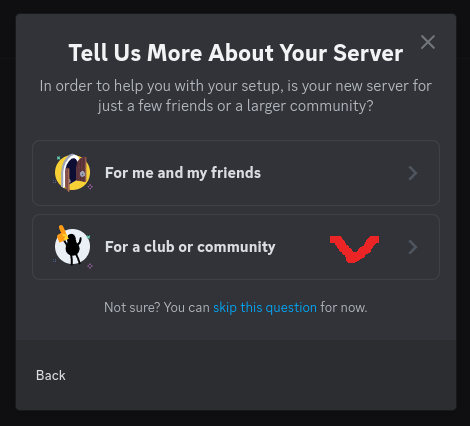
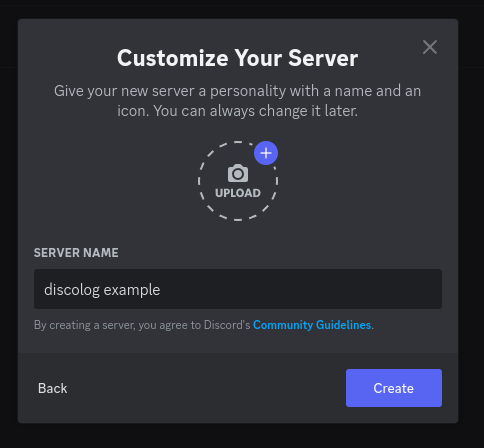
Right-click on the server and select Server Settings > Community Settings
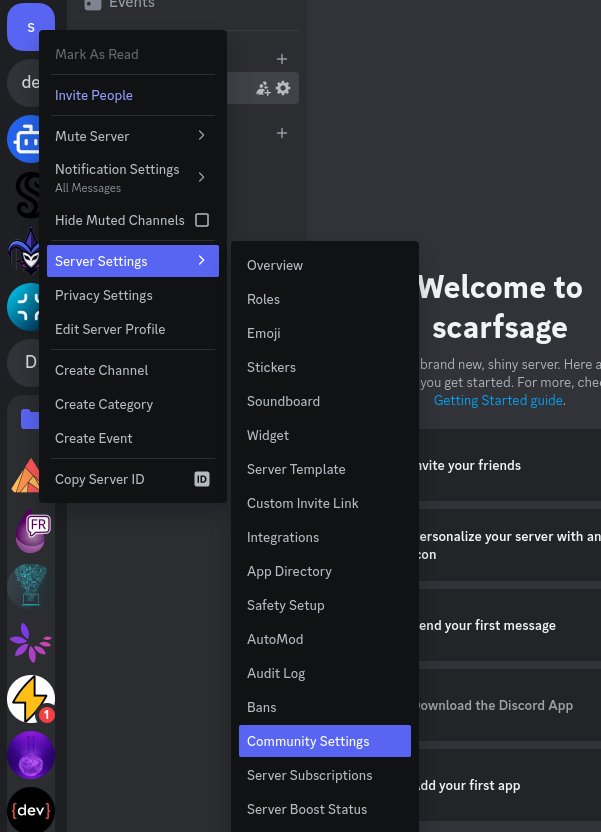
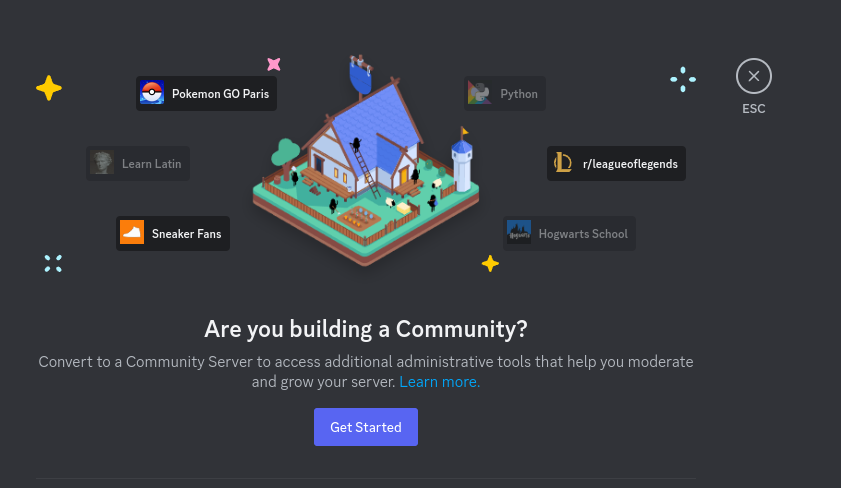
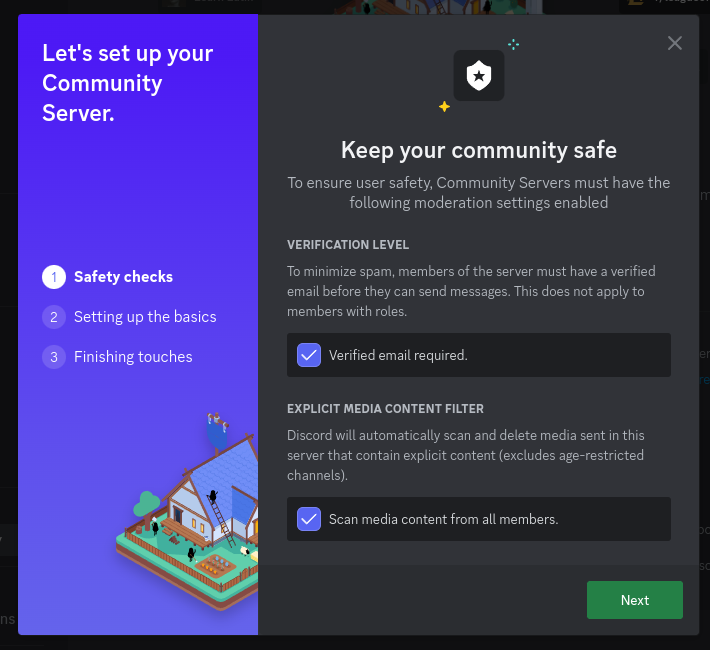
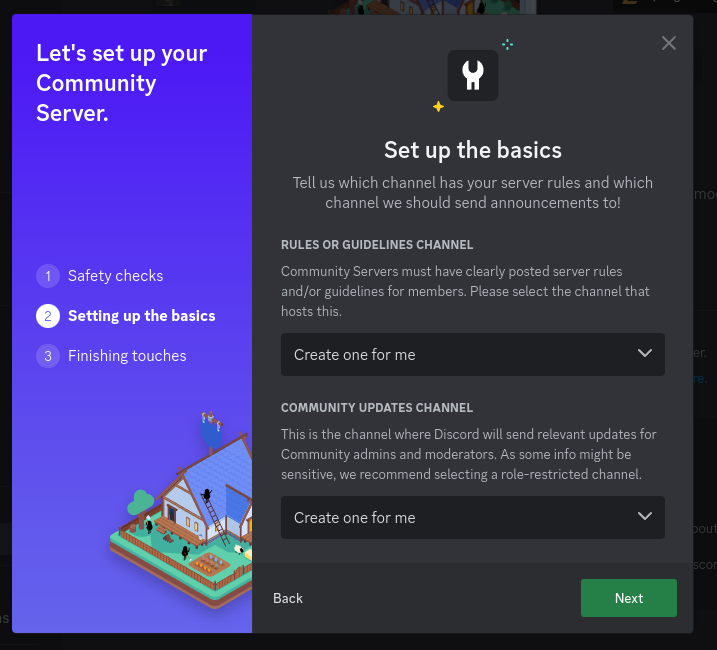
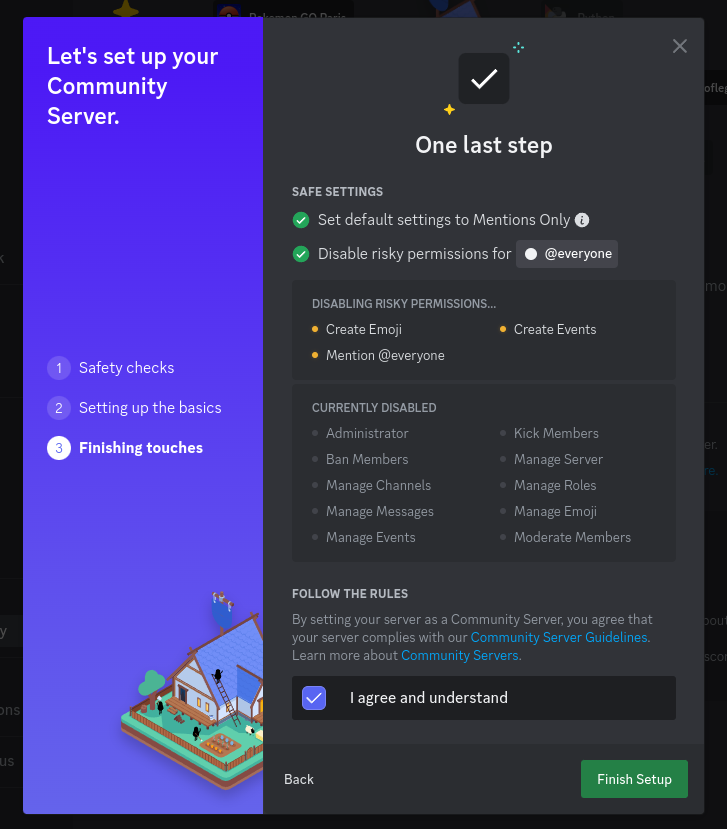
Copy the server ID, it will be needed later
+If you don't see Copy Server ID in the UI, enable developer mode in Settings -> Advanced -> Developer Mode.
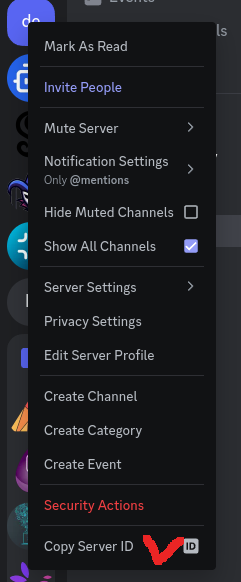
Go to the developers portal

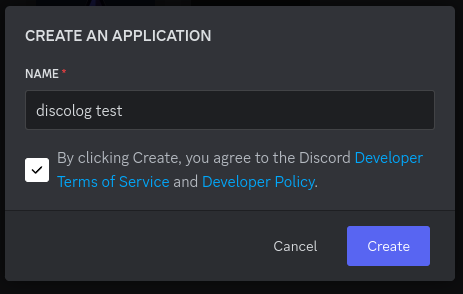
Disable User Install and add the scope bot and the permissions Attach Files, Manage Channels, Manage Threads, Send Messages, Send Messages in Threads
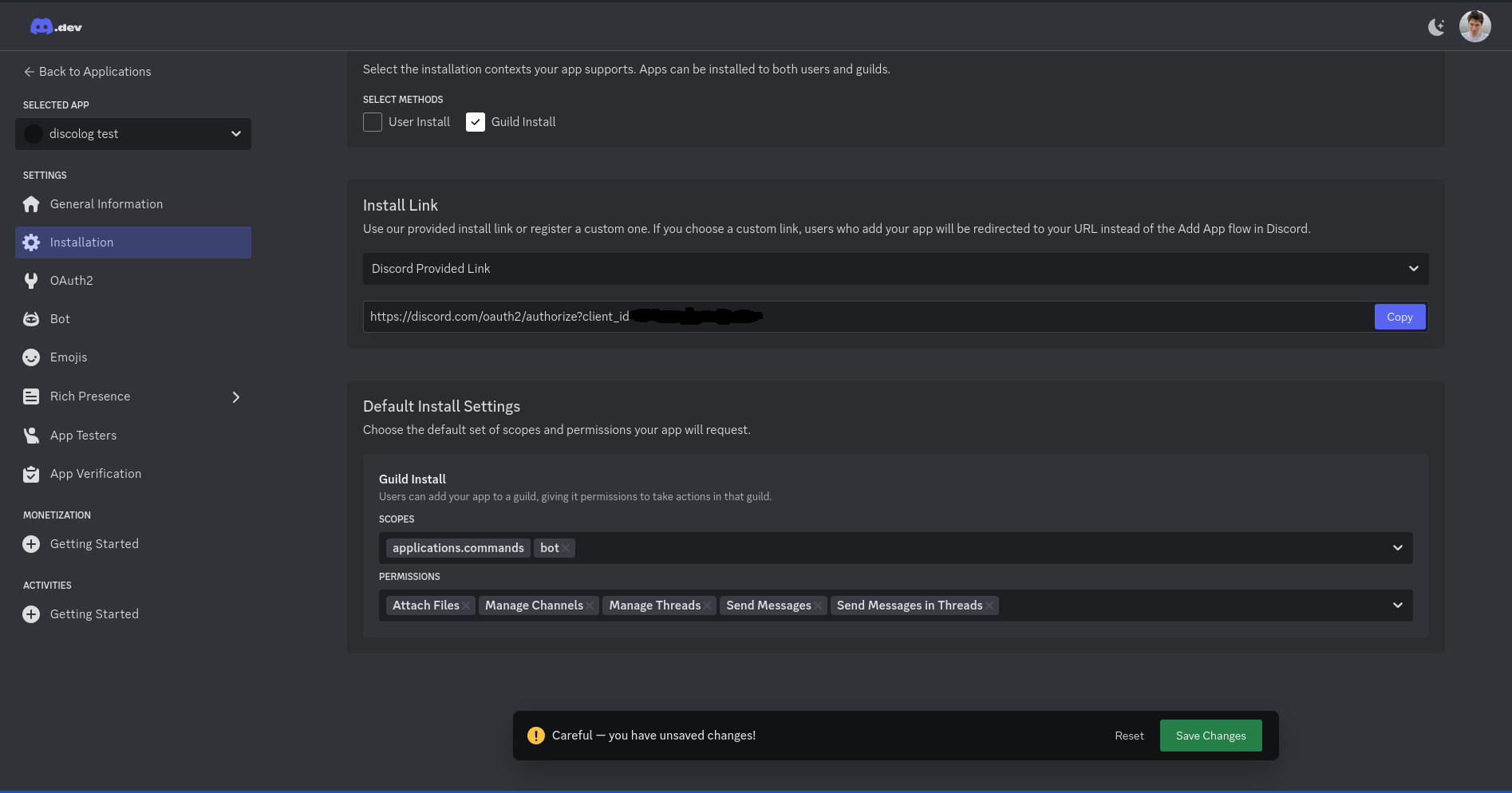
Generate and copy the bot token, it will be needed later
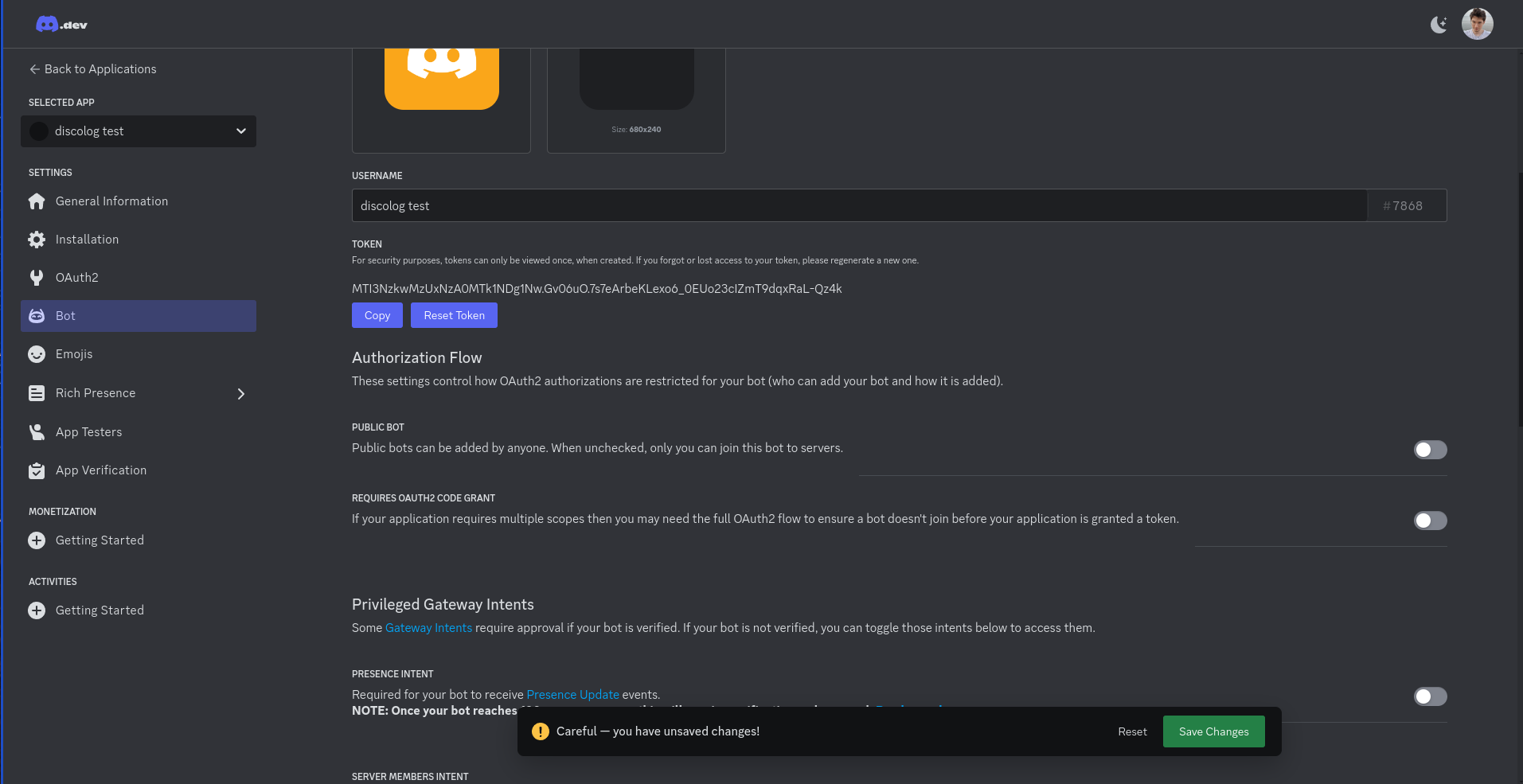
Go to the installation menu and open the installation link

Follow the steps
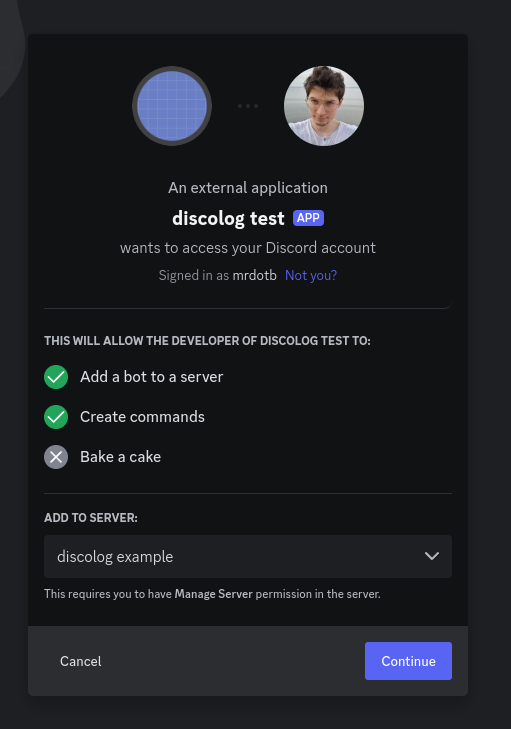
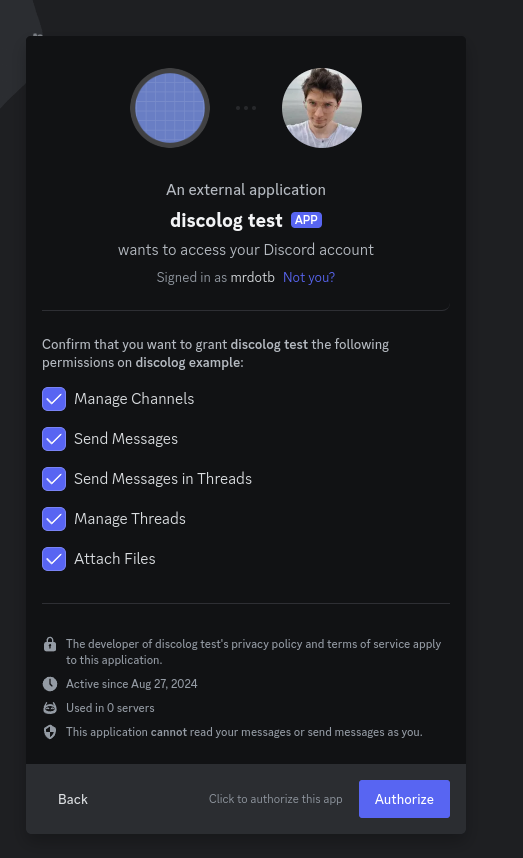
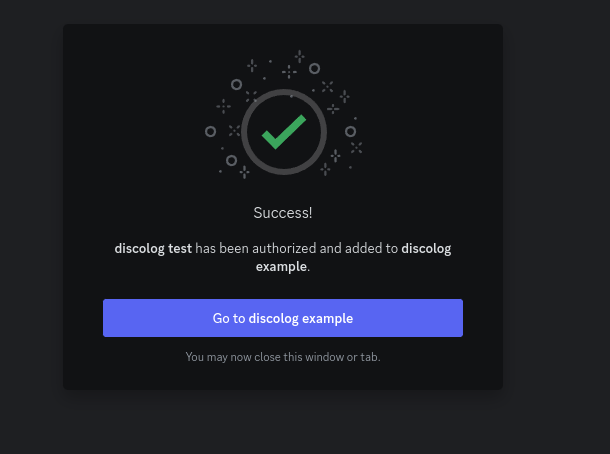
Edit your config/dev.exs and add the following configuration with the bot token and the server ID you copied earlier.
config :disco_log,
otp_app: :app_name,
token: "YOUR_BOT.TOKEN",
guild_id: "YOUR_SERVER_ID"Run the mix task
mix disco_log.createIt will create and output the rest of the necessary configuration for you. Use this configuration for your production environment or add it to your dev config if you want to test.
Confirm that everything is working smoothly by running the following mix command it will put a log in each channels.
mix disco_log.sampleHow it should look like
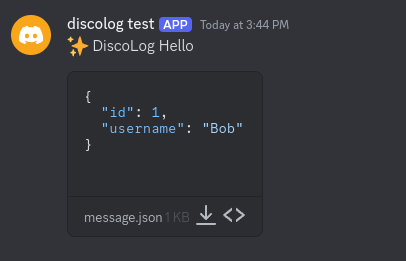

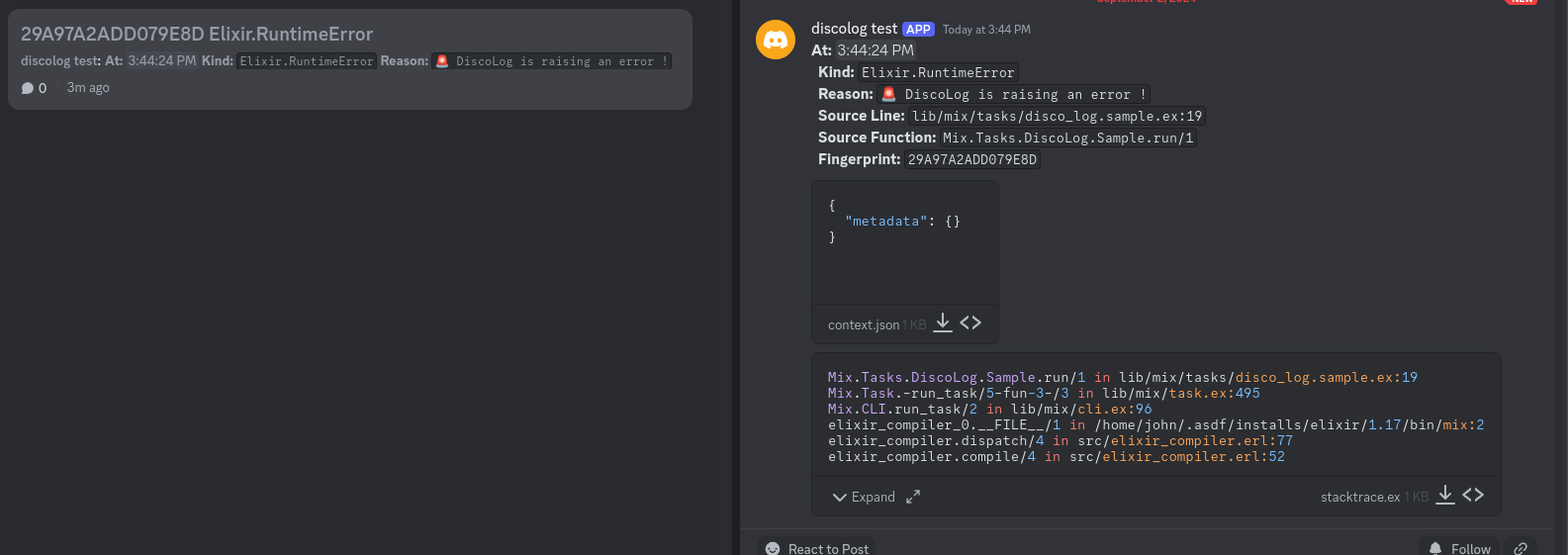
When you confirmed that the setup is working you should put this config to disable DiscoLog in dev.exs and test.exs env.
config :disco_log,
enable: falseDiscoLog can optionally set your bot's status to Online, allowing you to display a custom presence message.
Add the mint_web_socket Package
Update your dependencies in mix.exs:
defp deps do
[
{:disco_log, "~> 1.0.0"},
{:mint_web_socket, "~> 1.0"}
]
endConfigure the Presence Settings
Add the following to your config.exs or prod/config.exs:
config :disco_log,
enable_presence: true,
presence_status: "🪩 Disco Logging" # Optional, defaults to this valueBot with Presence
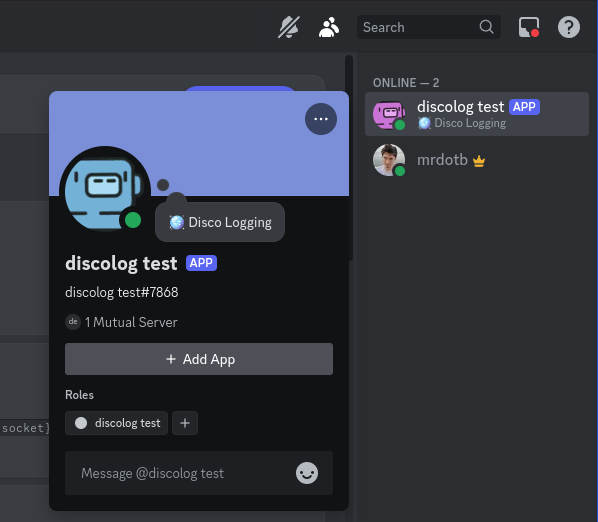
The Go to Repo feature allows DiscoLog to link directly to your code repository (e.g., GitHub). This enables users to easily access the specific version of the code related to a log entry.
Link to GitHub code
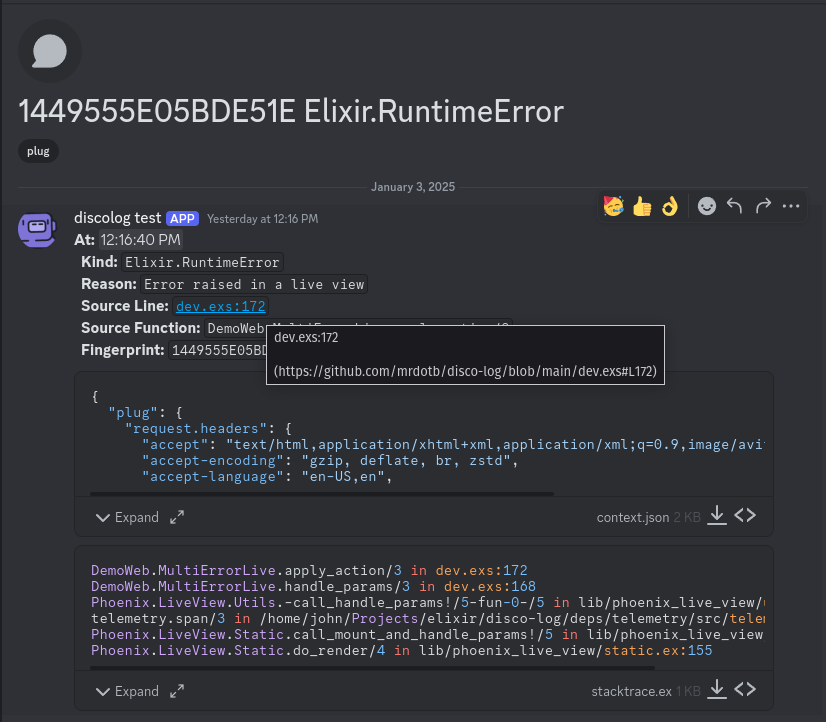
To enable this feature, add the following configuration to your prod/config.exs:
config :disco_log,
enable_go_to_repo: true,
go_to_repo_top_modules: ["DemoWeb"], # Optional, see notes below
repo_url: "https://github.com/mrdotb/disco-log/blob",
git_sha: System.fetch_env!("GIT_SHA") # See notes on setting the GIT_SHA belowGIT_SHA
The GIT_SHA should be the commit hash of the current code version. This ensures links reference the correct version of the code. Here’s how you can set it, depending on your deployment process:
If you build your release on your own machine, you can set the environment variable using this command:
GIT_SHA=`git rev-parse HEAD` MIX_ENV=prod mix release
When building a Docker image, pass the GIT_SHA as a build argument:
Build Command:
docker build --build-arg GIT_SHA=`git rev-parse HEAD` .
Dockerfile:
ARG GIT_SHA
# Set build environment variables
ENV MIX_ENV="prod"
ENV GIT_SHA=${GIT_SHA}In CI/CD environments (e.g., GitHub Actions), the GIT_SHA is often available as a predefined environment variable. You can pass it during the build process as follows:
Example GitHub Actions Workflow:
- name: Build and Push Docker Image to GHCR
uses: docker/build-push-action@v5
with:
context: .
push: true
tags: ${{ steps.meta.outputs.tags }}
labels: ${{ steps.meta.outputs.labels }}
build-args: |
BUILD_METADATA=${{ steps.meta.outputs.json }}
ERL_FLAGS=+JPperf true
GIT_SHA=${{ github.sha }}repo_url configuration should point to the root of your repository's code (e.g., https://github.com/<user>/<repo>/blob).go_to_repo_top_modules configuration is optional. Use it only if your project contains external modules within the repository.Enjoy using DiscoLog!
You can use the Disco Log Presence feature independently of logging. This is especially useful for apps running on a single node, in which case presence can serve as a simple way to display application status.
To set up Presence, first make sure you have disabled the default DiscoLog logger:
config :disco_log,
enable: falseThen, start a DiscoLog.Presence worker under your app's supervision tree. It's
probably a good idea to only start it in the prod environment:
defmodule MyApp.Application do
use Application
@impl true
def start(_type, _args) do
children = [
# Presence should start after workers required by the HTTP client (e.g. Finch pool)
...
presence(),
...
MyAppWeb.Endpoint
]
opts = [strategy: :one_for_one, name: MyAPp.Supervisor]
Supervisor.start_link(children, opts)
end
if Mix.env() in [:prod] do
defp presence() do
token = Application.fetch_env!(:disco_log, :token)
client = DiscoLog.Discord.API.Client.client(token)
opts = [
bot_token: token,
discord_client: client,
presence_status: "I'm online!"
]
%{
id: MyApp.Presence,
start:
{GenServer, :start_link,
[DiscoLog.Presence, {opts, Process.get(:"$callers", [])}, [name: MyApp.Presence]]}
}
end
else
defp presence(), do: %{id: DiscoLog.Presence, start: {Function, :identity, [:ignore]}}
end
end